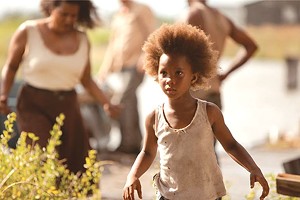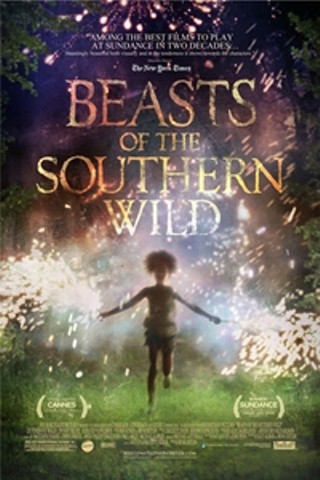Published August 8, 2012 at 9:50 a.m.
Seldom has an American film dared to put as much dirt on the screen as Beasts of the Southern Wild. Benh Zeitlin’s feature debut takes place in the Bathtub, a dilapidated Louisiana bayou community located on the wrong side of the levees, in a coastal area that mainstream America has abandoned to its fate.
The Bathtub’s inhabitants are diehards, living in stilted trailers and ramshackle huts among overgrown vegetation and piles of salvage and debris. The film’s heroine and narrator, 6-year-old Hushpuppy (Quvenzhané Wallis), has no interest in princesses, pink or sparkles. After her loving but frequently drunk dad (Dwight Henry) disappears, she’s too busy cooking her own dinner with the aid of a blowtorch.
It’s the type of scenario we’re used to seeing on screen only in well-meaning documentaries, but Beasts is fiction — technically, speculative fiction. While the setting is just barely futuristic, with climate change producing apocalyptic floods, the film really takes place in the space of fable. Educated by her community’s equivalent of a wise woman, Hushpuppy sees the world in mystical terms; she imagines primeval beasts called Aurochs emerging from melting polar ice as humanity returns to its “caveman” roots. Whether those beasts really exist in the film’s world doesn’t matter, because we virtually never leave Hushpuppy’s perspective, a jumble of fractured logic, passed-down lore and self-mythologizing fantasy.
Zeitlin conveys that perspective with naturalistic camera work, saturated colors and Wallis’ fierce, natural acting. He achieves scenes of intense beauty by simply showing us what Hushpuppy sees and feels, without explanation.
Yet this narrow focus can grow wearying over the long haul. Because Hushpuppy already knows the other members of her community, we never get to know them. A sequence set in a disaster-relief center serves to underline just how alien the mainstream world is to her, yet it also raises questions the film can’t answer, such as Why do these people proudly insist on living in a place that will eventually kill them?
As a result, a few critics have tried to interpret Beasts as a libertarian manifesto. But you might as well say the same of Huckleberry Finn, because the film’s real roots are there, and in hundreds of other American children’s stories about growing up in the wilderness and defending the family homestead. Hushpuppy’s unquestioning loyalty to her home and daddy make sense in kid logic, even when one is flooded and the other on the brink of dementia. Like all children — and, perhaps, all adults on some level — she trusts the known and fears the unknown. (That said, Beasts is definitely not a movie for young children; they’re likely to find it scary and perplexing.)
Some may see Beasts as a triumphant coming-of-age tale; others may view it as more of a Peter Pan for the climate-change era, with a heroine who has yet to grow up and leave Neverland. (A stunning sequence in a brothel, toward the end, suggests one dark possibility for Hushpuppy’s future.)
But, whatever its merits as a story, Beasts holds its own as a rebuke to the oppressive tidiness of American movies these days, from the blockbusters with their overdesigned CGI landscapes to the romantic comedies with their pastel dreams of suburban affluence. Zeitlin’s vision of people living close to nature is unabashedly, sometimes absurdly, romantic, but its unruly energy has been sorely missing from Hollywood fare. Here’s to more filmmakers who aren’t scared of dirt.
Beasts of the Southern Wild
Rated PG-13 · 91 min. · 2012
Rated PG-13 · 91 min. · 2012
Official Site: www.welcometothebathtub.com
Director: Benh Zeitlin
Writer: Lucy Alibar and Benh Zeitlin
Producer: Michael Gottwald, Dan Janvey and Josh Penn
Cast: Quvenzhané Wallis and Dwight Henry
Director: Benh Zeitlin
Writer: Lucy Alibar and Benh Zeitlin
Producer: Michael Gottwald, Dan Janvey and Josh Penn
Cast: Quvenzhané Wallis and Dwight Henry
More By This Author
Speaking of Movies, movie Review
-

Next Month Brings the Final Curtain for Palace 9 Cinemas
Oct 27, 2023 -

Book Review: 'Save Me a Seat! A Life With Movies,' Rick Winston
Aug 30, 2023 -

Steve MacQueen Named Executive Director of Vermont International Film Festival
May 22, 2023 -

Vermonters Are Going Back to the Movies — Under the Stars
Aug 26, 2020 -

Where to Catch a Movie Near Burlington
Sep 11, 2018 - More »
Comments
Comments are closed.
From 2014-2020, Seven Days allowed readers to comment on all stories posted on our website. While we've appreciated the suggestions and insights, right now Seven Days is prioritizing our core mission — producing high-quality, responsible local journalism — over moderating online debates between readers.
To criticize, correct or praise our reporting, please send us a letter to the editor or send us a tip. We’ll check it out and report the results.
Online comments may return when we have better tech tools for managing them. Thanks for reading.













































